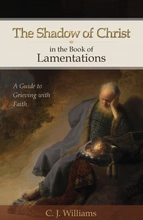
C. J. Williams
Reviewed by: Zachary R. Keele
The Shadow of Christ in the Book of Lamentations, by C. J. Williams. Crown & Covenant, 2022. Paperback, 208 pages, $14.00. Reviewed by OP pastor Zachary R. Keele.
Upon the bookshelf of our piety, certain biblical books gather more dust than others. Often we are not brave enough to admit this, but where Romans and the Gospels are well worn, other books hibernate under a layer of fine particles like a long lost first edition never cracked. Hence, it is good to grab the duster and let such stranded books see the light of day, and we ought to tip the hat to Dr. C. J. Williams for doing so with Lamentations. This short book squished between the giants of Jeremiah and Ezekiel is regularly lost in their shadows. Besides, our fondness for the cheerful and happy deprives us the stomach for Lamentations’ raw display of ruin, wrath, and spiritual bereavement. Dr. Williams, however, unfurls the grim verses of Lamentations to apply to our souls the faithful mercies of God amid sin’s darkest realities.
This book sprouted from a sermon series sown by Williams, which gives it a decidedly sermonic tone, despite his assessing it a commentary, though an atypical one. Rather than focusing on technical issues like date, authorship, and the history of scholarship, Williams’s exposition of the text of Lamentations is devotional, aimed at the saint in the pew. With his clear and approachable writing, this book would work well for a Bible study or Sunday school class, though some adaption would be required to fit its twenty-one chapters into your average quarter.
Its devotional purpose, however, does not make this book a bowl of confetti, as is typical for what passes as devotional nowadays. Williams labors well to walk through the biblical text with care and reverence in order to feed the reader with the meaty truth of God. Particularly, the author expounds Lamentations with a view to Christ, while eschewing any hint of allegory or fanciful retrojections of the New Testament. Based upon a point made by Herman Witsius, Williams judges that it is better to “over look” for Jesus than to overlook him (xvii). He boldly proclaims Christ and his work for us from Lamentations as the gospel arises naturally out of the text.
Another strong point of this book is its honesty. Topics like divine wrath, God as enemy, and gruesome covenant curses as the penalty for sin (including cannibalism) replay over and over in the stanzas of Lamentations. Frequently, we are prudes who cannot sit with these truths, or worse, we are too self-righteous to admit they apply to us. With refreshing candor, Williams, though, shows the terror of God’s wrath in all its awful splendor due to sinners. For, as he reiterates, if we photoshop or domesticate the judgment of God, then we dishonor and snub the pains of hell that Jesus suffered for us upon the cross.
The only minor quibbles with this edifying journey through Lamentations are some of Williams’s applications. The majority flow accurately from the text and are heart-searching, but a few of them are a stretch. Lamentations deals with the eternal wrath of God as expressed in the fall of Jerusalem, fulfilled vicariously by Jesus for us, and poured out forever in hell, and the author can be overly eager in a few places to relate this to our everyday hardships.
Nevertheless, this book is a welcomed and needed dusting off of a precious book of Scripture. Therefore, go forth and read Lamentations, behold the love of Christ to suffer for us, and taste new every morning the mercy of God.
April 27, 2025
The Devoted Mind: Seeking God’s Face in a World of Distraction
April 20, 2025
April 13, 2025
Suffering: God’s Purpose in Our Pain
April 06, 2025
Sunday Matters: 52 Devotionals to Prepare Your Heart for Church
March 30, 2025
On the Trail with a Missionary
March 23, 2025
Midnight Mercies: Walking with God Through Depression in Motherhood
March 16, 2025
© 2025 The Orthodox Presbyterian Church